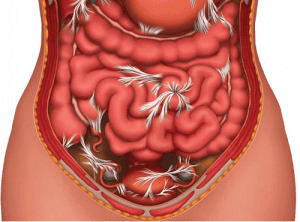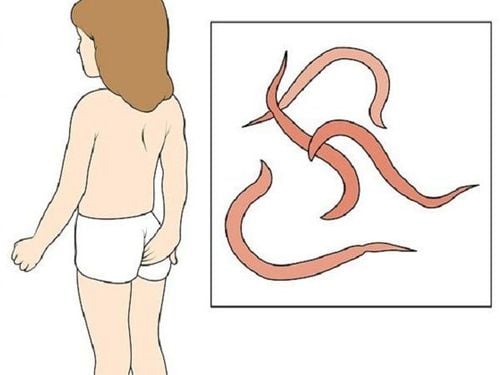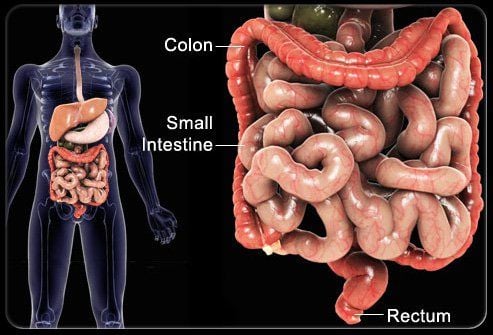This is an automatically translated article.
Crohn's disease is a chronic inflammatory bowel condition that leads to abdominal pain, severe diarrhea, fatigue, weight loss, and malnutrition.
1. What is Crohn's disease?
Crohn's disease is a chronic inflammatory bowel disease that mainly affects the small intestine and large intestine. However, Crohn's disease can also occur in any part of the digestive tract, from the mouth to the anus.
Crohn's disease is divided into several types depending on where it occurs in the body, such as: Colonic Crohn's disease, ileal Crohn's disease, Crohn's chronic enteritis and others.
Inflammation can cause superficial and ulcer-like lesions. Some patients have large and deep ulcers that will lead to scarring, gradually hardening and narrowing of the bowel. Sometimes ulcerative lesions penetrate the intestinal wall, creating the risk of developing complications such as intestinal obstruction or infection in the abdominal cavity (peritonitis). People with Crohn's disease will continually experience cycles of remission, followed by a return of intense symptoms.

Bệnh Crohn lâu ngày gây tổn thương nhiễm trùng trong khoang bụng
2. Symptoms of Crohn's Disease
Common symptoms and signs of Crohn's disease often include: Abdominal pain, diarrhea, vomiting, fever, and weight loss.
The exact cause of the disease is still unknown. Some medical experts think that genetic factors may play a role. In addition, it is more likely that a virus or bacteria can also trigger Crohn's disease. As the immune system tries to fight the invading foreign organism, an abnormal immune response occurs that causes the immune system to mistakenly attack cells in the digestive tract.
Some of the risk factors that contribute to the onset of Crohn's disease include:
Age: Crohn's disease can occur at any age, but most people who develop Crohn's disease are young, diagnosed before up to 30 years old; Race: Crohn's disease does not exclude any ethnic group, but Caucasians and Eastern European (Ashkenazi) Jews are most at risk. Family history: You're at higher risk for Crohn's if you have a parent, sibling, or child with the disease. Up to one-fifth of Crohn's patients also have a family member with the disease. Smoking: This is a controllable risk factor. Smoking also makes the disease worse, thereby increasing the risk of surgery;

Hút thuốc lá cũng khiến cho bệnh tình tiến triển nặng hơn
Certain nonsteroidal anti-inflammatory drugs: Although they do not directly cause Crohn's disease, these drugs can make chronic intestinal inflammation worse; Geographic location: People who live in an urban area or an industrialized country are more likely to have Crohn's disease. The cause can be due to environmental factors, including a diet high in fat or refined foods, processed canned goods.
3. Is Crohn's disease contagious?
Crohn's disease is not contagious. You cannot get Crohn's disease from another person, even if you have sex with the patient.
However, the disease can spread in the gastrointestinal tract of the infected person. The mechanism of internal spread is similar to that of other IBD inflammatory bowel diseases.
This condition can be managed with anti-inflammatory medications, anti-diarrheal medications, nutritional therapy (reducing exposure to food-borne irritants) and even surgical intervention.

Bệnh nhân có thể hạn chế bệnh lây lan nội bộ bằng các thuốc chống viêm
4. Diagnosis and Treatment of Crohn's Disease
People with Crohn's disease will have early symptoms such as: Abdominal pain, fever, diarrhea, and weight loss. However, these manifestations are not specific. Therefore, the doctor needs to evaluate through testing, imaging and endoscopy to diagnose the disease.
The patient will initially have blood and stool tests, as well as an abdominal X-ray to rule out other medical conditions. Methods such as CT scans and MRI scans will help doctors see the bowel wall in detail.
Treatments for Crohn's disease will vary, depending on symptoms and severity. People with mild or no symptoms may not need treatment.
Thus, answering the question "Is Crohn's disease contagious?", doctors confirm that Crohn's disease is not contagious from person to person. However, genetic factors among family members may play a role in the onset of the disease. This chronic inflammatory bowel condition also carries the risk of spreading to other areas of the entire digestive tract.
Please dial HOTLINE for more information or register for an appointment HERE. Download MyVinmec app to make appointments faster and to manage your bookings easily.
The article references the source: mayoclinic.orgMORE:
Clostridium difficile infection causes intestinal disease Is it dangerous for children with intestinal inflammation, vomiting, and diarrhea? 11 ways to best protect your digestive system













